In turbulent times, Kirsteen McNish is drawn under the earthy sheets of her garden.
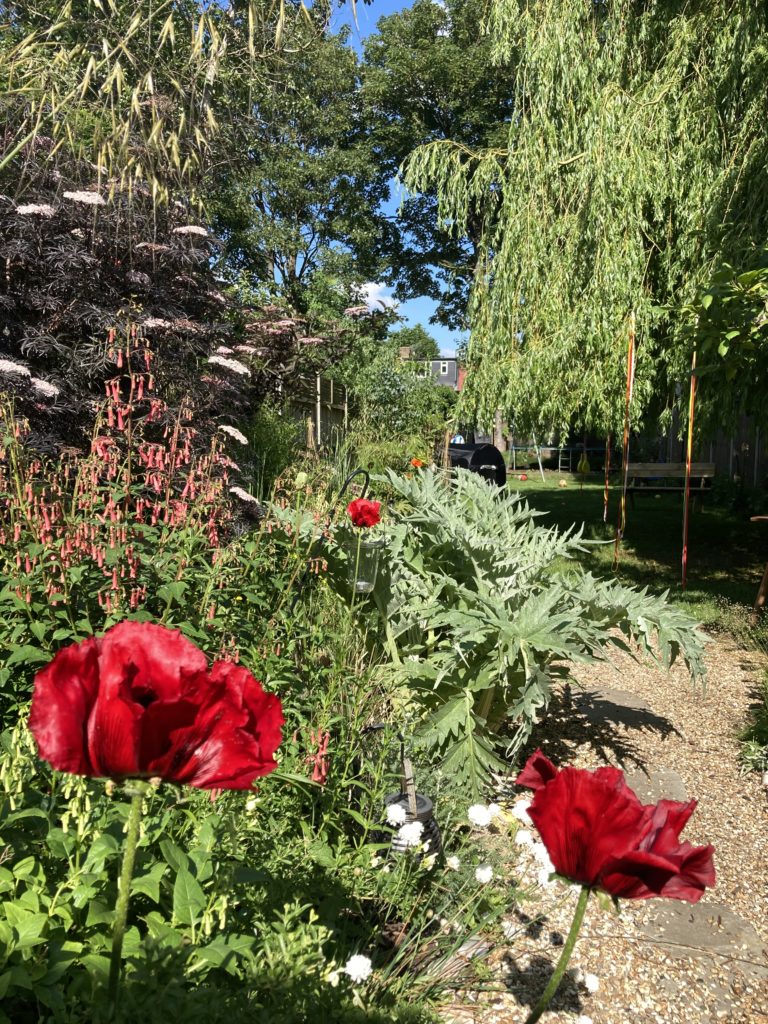
Maybe it’s peak middle age, perhaps it’s the frustrated artist in me, or maybe I just need the grounding, but this space that exists outside of my house has become a kind of daily salvation. I plant this place erratically and here there is no order; no routine which stymies my natural flow. It’s here I really dissolve. I push my hands into the earth and forget myself until I am dirty, bleeding and dehydrated. It is the bookend of my days — I have become ninja, not disturbing creaking stairs, and know it’s a blessing to be out there early and alone listening to the trees seemingly in conversation with each other. I watch the Willow sway and undulate and try and try to release the hard knots in my neck and jaw from the day’s tension or the occasional sleep paralysis that makes my limbs leaden and unable to emerge from Davy’s locker of night-terrors. Night-time is also a hallowed time. I watch the moon wax from crescent sliver to full milk pail under the silvery clouds and satellites. Recently on a hot summer’s night of listlessness, air like thick static, a blessed five minutes of rain came and I smiled as I heard a distant party crank up the music — hot air carrying the sound of people whooping like a far-off foghorn. I lay on the grass, smiling, imagining them all dancing in the rain, my arms in the air and drugged by the heat and a hectic day until I am yanked back into consciousness. I see dozens of creamy night moths flittering between the flowers and I reluctantly push myself onto my feet and pad indoors from my garden.
My head feels heavy with this heatwave, my body feels swollen like overripe plum and it’s only early in the day. I am jittery with coffee and adrenaline-fuelled — my (just) teenage daughter has recently had health issues, unexpected seizures that left us all reeling with a backpack of dread of more coming, and I am fretting bone-deep as I crumble dry leaves between my hands, pinch off dead flower heads, marvel at new, lilac, tissue-thin exotic poppies, and try to ignore the heavy feeling that sits like a gargoyle on my breastbone. The teasels that were starting to fuzz with a purple bloom are frozen in their tracks by the 40 degree plus heat, their leaves are wan and drooping like a scolded spaniel’s ears. The normal sounds of young children playing after breakfast cannot be heard and the row of terraces feel distinctly Mary-Celeste-like — even the birdsong feels quieter, like the world is holding it’s breath. But as kids filter past in uniform at 8.45am I wonder if it’s only me that is feeling this nagging foreboding, and I admonish myself for catastrophising.
Later in the early evening after a day of her crying, I take my fractured daughter to a cheap hotel room overlooked by the motorway and a huge pylon, just for the cool of the air conditioning after watching her weaken as the day grows longer. I’m grasping at straws, and I know it — fretfully pushing her hair off her forehead as her skin looks wan. She rallies and has a blissful two hours of me reading her books and DVD cartoon watching on her old portable machine, and as we eat doughy warmed up pizza later in the hotel foyer. My son gets up agape watching fires burning on the large screen whilst travelling workmen drink dozens of green-bottled beers the other side of the television, animatedly discussing Love Island and the leadership race as houses in nearby Essex catch light. Later as I turn the light out, grateful for the cool sheets, I realise she cannot wind down as boy racers are whizzing around the carpark separated only by thin external walls and the sky looks like a Bladerunner burnt orange that matches the hue of the Sainsbury’s hypermarket sign perfectly. I have the increasingly sinking feeling I might have to take her back home before she becomes distressed by this unfamiliar place with all its strange noises, sticky carpets and weird transience hanging in the air. As she lies breathing heavily with the unfamiliar surroundings, wringing her fingers origami-like over her chest, I stroke her hand — every inch of me vibrating with mounting worry mixed with the guilty frustration that she isn’t going to nod off — so I cast my thoughts to my garden to prevent me from throwing the towel in and slinking back home.
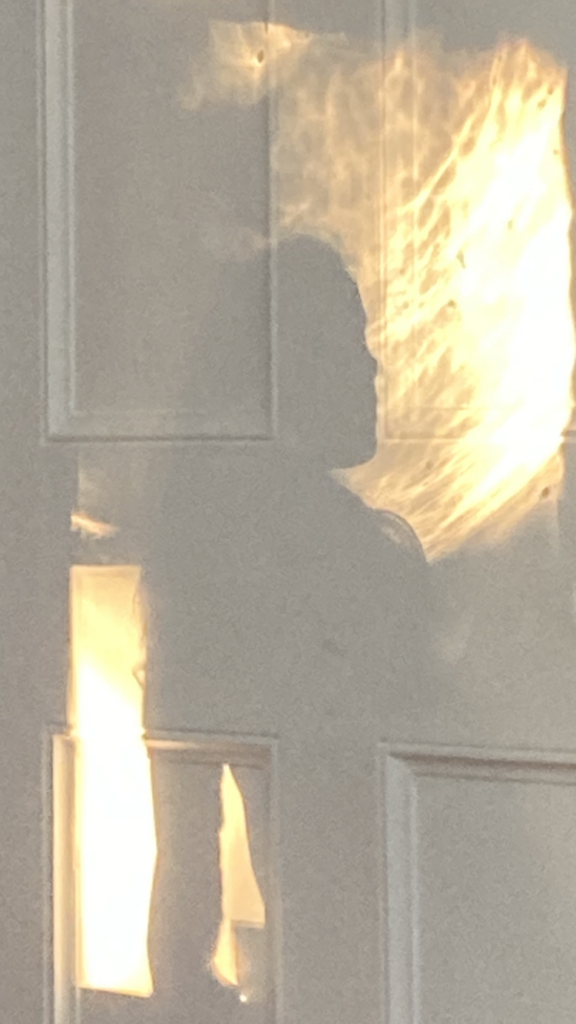
The garden is Frankenstein’s monster of hotchpotch experiments. With the unfathomable shock of losing my sister five years ago I started it all off, planting for distraction by sewing sweet peas and runner beans that perished to be replaced by heady, saucer-size red poppies that live for a fleeting time before losing their flouncy skirts to the wind — ethereal and delicate like Rachael was herself. When my friend Graham died two years ago, I was walking in Epping forest when his partner Sunnifa’s shaky voice relayed to me he’d gone over as the strange sound of dew fizzing in the heat on leaves evaporated like will-’o-the-wisps. Ten minutes later I walked into a garden centre tucked away near the forest ride and scooped up a large, burnished copper Acer that swayed gently, catching the early summer light — and squeezed it into the back seat between grumbling children. I plunged it into the garden once home, sobbing, to remind myself never to forget his humour and quiet energy, and the fact that he was lost at sea in the middle of an epidemic, meaning no one could even squeeze his partner’s hand across their dinner table. I had told him I loved him through his open living room window the week before, obscured by blinds, unable to embrace him as Mexican daisies sprung from the space between the house and the front yard. In early January of this year when my mother was dying, quite suddenly unrecognisable and shadowlike, one of her last requests to my brave youngest sister — who had been taking care of her and my Dad diligently — was to open the blinds so she could look upon her beloved rose tree in her garden. My relationship with her had been largely turbulent but our last conversation, as I sat next to her trying not to look shocked, was an exchange about our respective gardens, and a kind of healing between us spread and grew after years of what felt like an odd patchy wilderness.
Since she died the openness in me has felt strangely stifled. As soon as tears prick the back of my eyes a tap somewhere snaps firmly off. I don’t want to talk or text most people, let alone be touched, and I am out in the garden most days pushing it all quietly back into the earth. In the days after I watched one of her favourite films, Rebecca, in bed, and my eyes scanned the gardens around Manderley,imaging them in full technicolour in the hope that I could spot things I could plant in a dislocated memorial of my own making. I also buy roses she loved the scent of, even though I have never liked roses, preferring wild grasses, thistles and leggy swaying flowers. I recall the smell vividly from childhood, along with over-soaked tea bags and sugary milk as she and my grandma did their ritual perambulation of the garden when they visited each other, looking at flowers and exchanging comments — and my heart squeezes with an acid tang knowing we never did, and won’t ever, do the same. But as I watch my own daughter, who has no voice of her own, her long fingers stroking the air as I dig and plant near to her, I know I have something different but still an understanding between us — silent but still tangible. I wasn’t there when my mum passed away on that early January evening, having returned home to London with a cement feeling in my stomach, a thing that haunts me like an old song you can’t quite shake, and I am not sure I will ever really feel right about it. In the following days it felt like a small part of me loosened and slunk off into the woods. But when the inevitable news came via a phone call from one of my sisters, my intuitive daughter pressed her forehead against mine and the Yew tree moved slowly and heavily like cattle lowing in a field outside the bedroom window. I felt my daughter’s hot breath on my face and gentle hand on my arm and was somehow simultaneously earthed and floating like a dandelion clock in the darkness.
Months later and still feeling quietly dislocated I arrive at The Minack Theatre for an event I’ve curated, swaying like one of those plastic inflatable figures outside service stations after a restless night on the ironically named “sleeper train”. The day started in a kind of grey slick of a sky pulling into Penzance station, but by 2pm that afternoon the sun is bouncing off the turquoise sea in Porthcurno like firecrackers. I feel hot and conspicuous arriving on site with my hastily packed trundle suitcase stripped of lucid sentences. Tiredness feels like it has taken off a layer of my skin, and surrounded by the sparkling sea and the exotic planting in a technicolour surreal glory of golden alpines, dressed in too-warm clothes, my eyes are dazzled with cerise pink and yellow plants that seem to sizzle around me like a trippy kaleidoscope. As I walk around the graduated sections of planting, I see a stone-carved sign set into a wall that says, “Rowena Cade created this theatre” and I feel like I am floating in a strange, bewitching reverie. I had gazed at photos of the theatre for years and done my research, but nothing could have prepared me for the acid brightness of the plant life, its Mediterranean microclimate and this feeling that I had entered a sacred place of magical properties. After we are set up for the event, I look at open faces of these gifted women I am working with, and I feel a kind of once-in-a-lifetime kinetic energy of connection flow between us. All is easy and alive and perfectly in sync with the surroundings. Later, as Rachael Allen, Anna Pheobe and Kathryn Joseph perform, rivulets flow down my cheeks and tectonic plates shift inside me. I had chosen from the get-go to base the artists’ performances around the elements — Rachael connected to Water, Anna to Air and Kathryn to Earth — and unexpectedly the bejewelled garden and skies provide all the Fire we needed. The jackdaws and drifting seagulls join us, strangely synchronising with each gasp, making a performance. Everything is illuminated as the rising sea bears witness once again to the human stories played out on that stage, as they have been for decades. The audience’s emotions rise and fall back to us from the coliseum-style seats, and we are like kite tails whipping across the ocean. Such is the power of this place. Later, as Kathryn, her friends and I walk back to our digs, I look back at her and hear her delightedly laughing, taking photos against the silhouettes of giant grasses and seed heads, the sky alive with amber red and mocha streaks, and all is in sync yet slow, echoing just how speck-like our existences are in the never-forever. This theatre, its garden and its wildlife will outlive all human life that visits it — of this I have no doubt. I press a succulent between my fingers and as its sap oozes through my fingertips, I know this fecund sacred place and this night will stay with me for as long as I live.
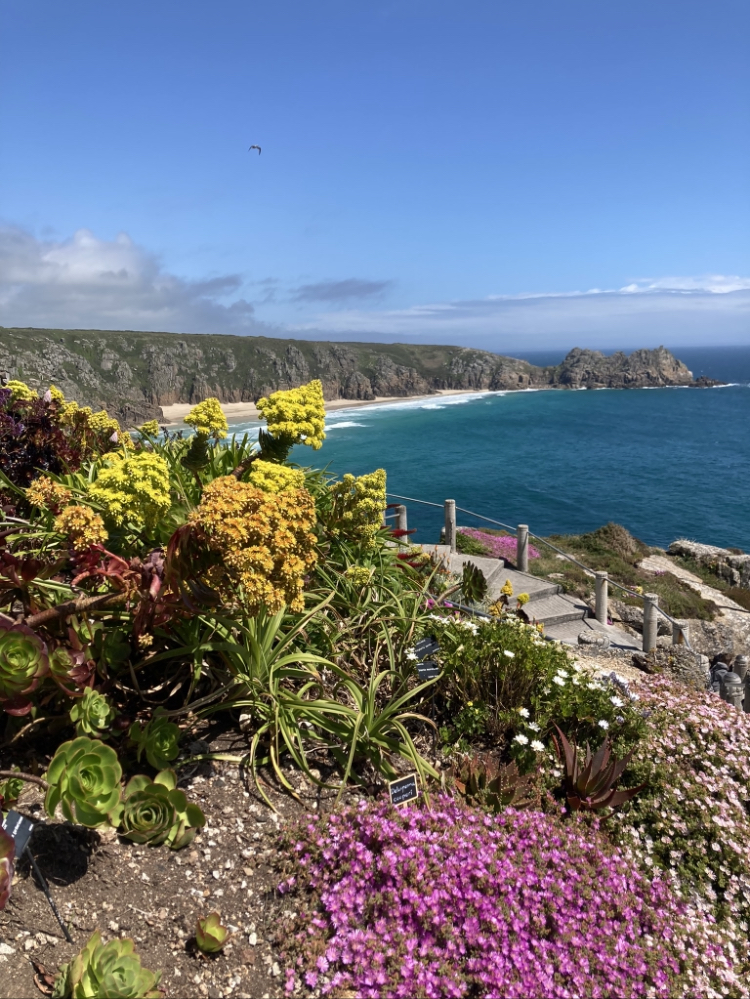
Last week after three long years of missing my old friends, we arrived again in a Scottish border town called Kirckudbright, and after a doorstep reunion, we are all soon standing upon Doon beach near to the whale rib skeleton of an old wreck, the incoming tide lapping around our legs, my daughter soothed and happy after traversing some three hundred miles, and my son ecstatic to see his friends. We fall asleep in their house later under a pea-green duvet and wake in a room bathed in soft lemony light with a seascape hung over our bed, keeping watch like a beacon. Upon waking I feel mellower and more my old self, despite feeling the subconscious sea-fret which was starting to rush into my thoughts about the following day’s impending boat journey which I had promised myself (and my friends) I would attempt again — three years after the last one was aborted in deep primal fear.
I ventured into their new garden at 5.30am with a treacle-strong coffee and before I knew it I was weeding, windmill-like fluff sticking to my clothes and hair. Not satisfied, I started turning over all the earth with an old shovel that blistered my hands and dug splinters into my palm. It’s compulsive and I can’t stop. I allow a flickering thought that somehow I am eternally bad at resting when opportunity arises, and worse still, that I am getting used to discomfort rather than stopping to survey the scene and take stock. I also know my friend wants me to wind down a bit and relax, but I want to give her something in return for their kindnesses and support over the years. This patch, which still housed the ghosts of the previous owner’s efforts in the form of soft fruits in Victorian strips, is now choked by nettles and dandelions. Later that day after visiting the gardens of Arbigland and the breath-taking cove taking notes of what grows happily there, I pick up verbena, scarlet geums, baby pink anemones, plate sized white daisies and alliums whose heads made up of a million stars from a local walled garden, all grown locally by a graceful woman who had created her own garden sanctuary that bloomed in the space like full rich cushions and tapestries against the high brickwork. She doesn’t mention my pink, sun-flushed face and measuredly tells me rain will soon come and I hold on to these words like an anchor. My young lad complains that we are on holiday in another place full of plants but later hugs me as I stand in the back yard as we stand on the loamy, sea-smelling earth and air. Part of his ten-year-old self has no doubt recognised his mother is self-soothing with this impromptu excited activity. Within an hour butterflies, bees and buzzing insects visit the garden as the night falls plants seem to bob their heads in consent. Here I was planting for friendship and new growth for people I love after fallow times.
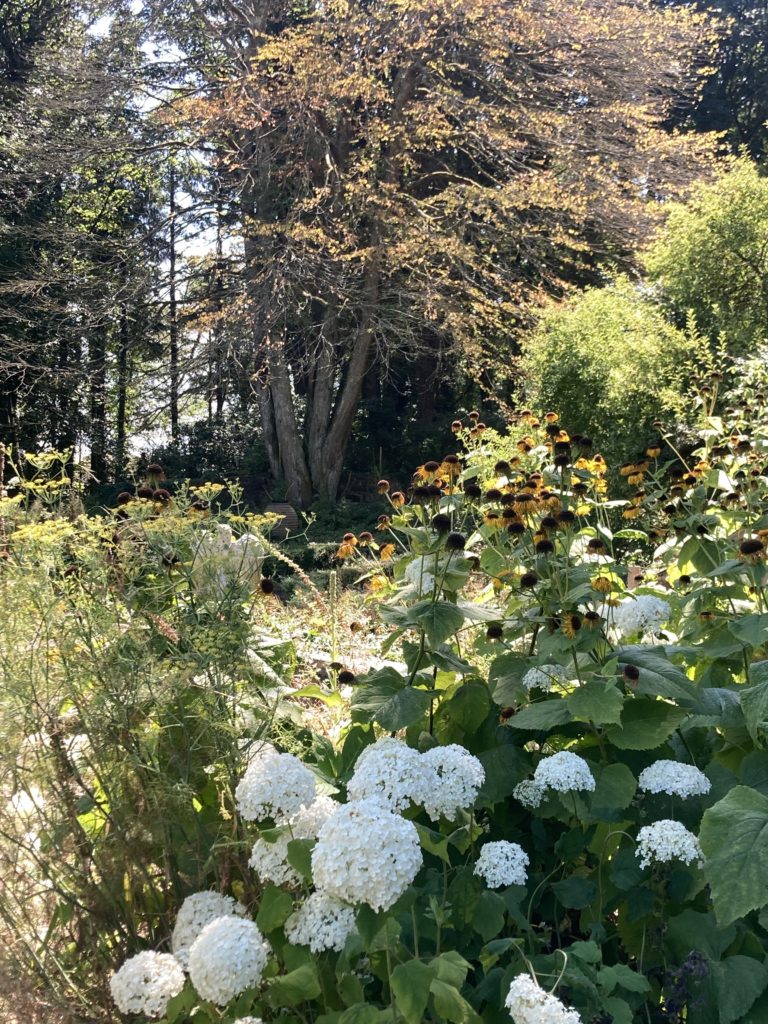
24 hours later the boat embarks from the harbour, legs trembling as I hold on, vice-like, to my usually Selkie-like daughter, terrified she will throw herself into the sea — but instead she is trepidatious and appears to be nervous as she’s lifted over the side. She, like any other child her age, is changing, and it’s hard to remember sometimes the tides are shifting in her in the throes of teenage hormones and internal whirlwinds, and she has no way of telling me what swirls within her. I try to pick up on what’s going on watching her body language, but often recently I am out at sea guessing. My jaw is set hard as we lurch into action and behind my shades and thin smile, I’m gripping the hot aluminium as my knuckles smart. Serendipitously I try to look back at the gardens of Broughton House and spy a Grey Heron peering at us from the banks. My partner shoots a gentle smile at me, knowing this totemic bird appears when I am struggling and has now marked this journey auspiciously. In the middle of the glittering Summer sea the water splashes over the bow and the light is almost blinding. My friend holds my hand and I imagine my roots reaching down ribbon like under the surface. As my damp hair slaps my face like seaweed each rivulet of rippling waves seems to drip into my husk-like body like the tin can amounts of water I’d fed the plant roots with the night before. I am finally letting go and my body feels the surge. This lifetime’s obsession with the sea has almost been distant and romantic, preferring to look upon it rather than wading in — but now I’m slowly learning to let it ooze through my fissures.
On dry land that day as I watch Swallows feeding their young for the first time, I recall a conversation with someone I was once close to, who expressed the idea that grief wasn’t something that was shared with other species in the natural world and that they just got on with it. But as a young Swift dropped from a neighbour’s eaves two weeks ago, I heard what must have been its parents screaming louder and it felt they were swooping lower than I’ve seen before in eight years of watching them devotedly. I see two squirrels frenzied when they find one of their own dead in the border of my garden, and they run around in circles, checking and re-checking for at least half an hour, squawking loudly to each other, manic with something akin to shock. Sadness for those who have gone is often encouraged to be locked away, boxed off, boarded up like an old shop — I’m not sure we can always find a way to sit with what makes us feel uncomfortable and gnarly, human nature to avoid discomfort. Grieving whether for death, relationship or a place seems to have an acceptable sell-by-date, a short bloom, and you are often willed to move on when everything feels like it is a slow blur through cellophane. We mourn cultural figures publicly on social media but often cross the road from the pain of someone we know personally. We send flowers and hope we can say the right thing to balm the recipient whilst we shift from foot to foot and avert our gaze and dream up distractions. I know I have done this many times — using sticking plasters that will only inevitably peel off. Looking to remedy something, weed it out or hope for neat answers or revelations. I am reminded of Sunnifa telling me that grief was simply the ongoing expression of how much that person was loved.
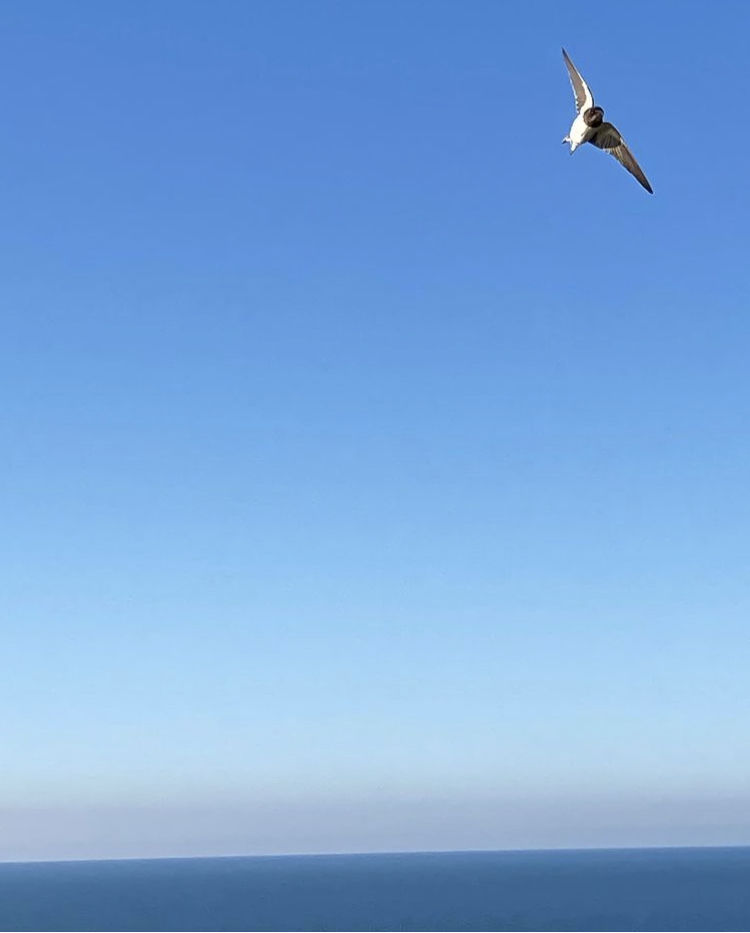
Tending this garden, I am also trying to teach myself to let go of things that set me off kilter, of connections that have whittled into a thin skein, of things I will never be or no longer crave. I learn with the seasons that the only thing we can rely on is that things will inevitably change.
Back from Scotland after an epic journey in the glowering hangover of the day’s heat, I sit under the Sturgeon moon and elatedly read on my phone there will be a storm in the week, as all around me the flowerbeds look like they’ve had a hard night out on the tiles. My cat twirls around my ankles, mewing a loud welcome home, but I can feel a restlessness dancing in the sap of me. I can hear the roar of wayward teenagers on dirt bikes on the main road that splits off to the marshes, the sound of a couple fucking loudly from an open window, the drift of a TV applause and neighbourhood dogs barking greetings to each other like a network of lighthouses flashing in the dark — the hot air amplifying it all. The first neighbour to talk to me when I moved here 8 years ago stands on his step smoking, and like clockwork raises his hand in greeting, as he does each day every day when I put out the bins or water the plants. It feels simultaneously alive, buzzy, visceral, familiar and reassuring to be back. The centre of the city that we saw from the motorway throbs an orange, brown and purple haze and I am casting out into the darkness, looking for something new to attach my restlessness to, wondering what, who or where that is.
A lager bottle in my hand drips dewy drops down my wrist and I squint in the dark at my haphazard, tumbling planting, which refuses to be cajoled or snipped into shape. I accept it won’t always thrive or oblige, despite my constant attention. This privilege of a garden has also slowly taught me to outgrow old ways, whilst giving me solitude and shelter from things that make me flinch and reel. My friend Alex called it a sort of portal after he fell asleep under the trees in high Summer — and those wise words have swum around my head ever since. I have plunged myself headfirst into this place like a lust-filled encounter with a familiar lover that knows how you tick, and it has reached back to me, drawing me under its earthy sheets.
As I sit wearily on the garden bench, my daughter suddenly runs out into the darkness twizzling something between her palms, content and focused. Her countenance is lit up briefly by my phone screen telling me that my friend in the Borders is out under the same full moon’s buttery glow, watering those new flowers that I planted to surprise her. The light is special there and it dances, bathes in pools and trips fantastic. I feel my chest expanding like old wood under sun with affection for my friend, her partner and children who have patched us into their family, us rising and falling with their rhythms, unjudged, free and subtly held like expanding fruit in a seedpod. The dam that has been building inside of me needs to break, however messy and unruly.
I stretch back my neck and think of the hot amber melt of Nina Simone’s voice that brings in a slight breeze of yearning and augur:
“For we’re like creatures
In the wind
And wild is the wind,
Wild is the wind”